Last updated on April 22, 2024
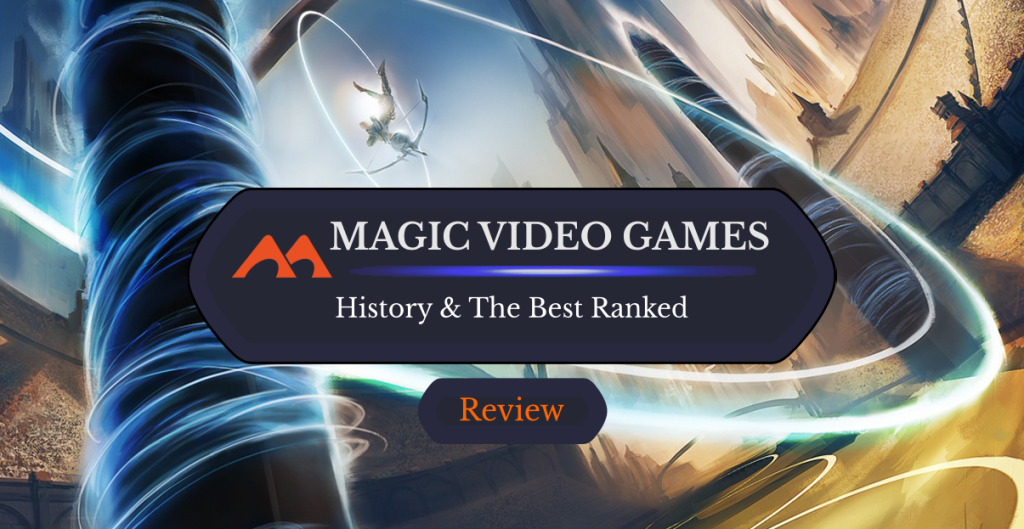
Skygames | Illustration by Sam Burley
Wizards has made numerous forays into the video game market throughout Magic’s 30-year history. Some strived to capture the essence of paper Magic in a digital environment while others departed from the card game framework entirely in favor of RPG or real-time strategy gameplay.
A lot of these games have not aged well. Some felt dated the second they were released, and many were completely abandoned by WotC. But don’t let that stop you from checking them out! These are important relics from Magic’s past and are worth a heartfelt chuckle at the very least.
Luckily you don’t actually have to dig through the catacombs of YouTube videos and Wiki entries, because I already have. I’ve ranked each of the Magic video games for you, right here, right now. Let’s hop right in!
How I Picked the Best
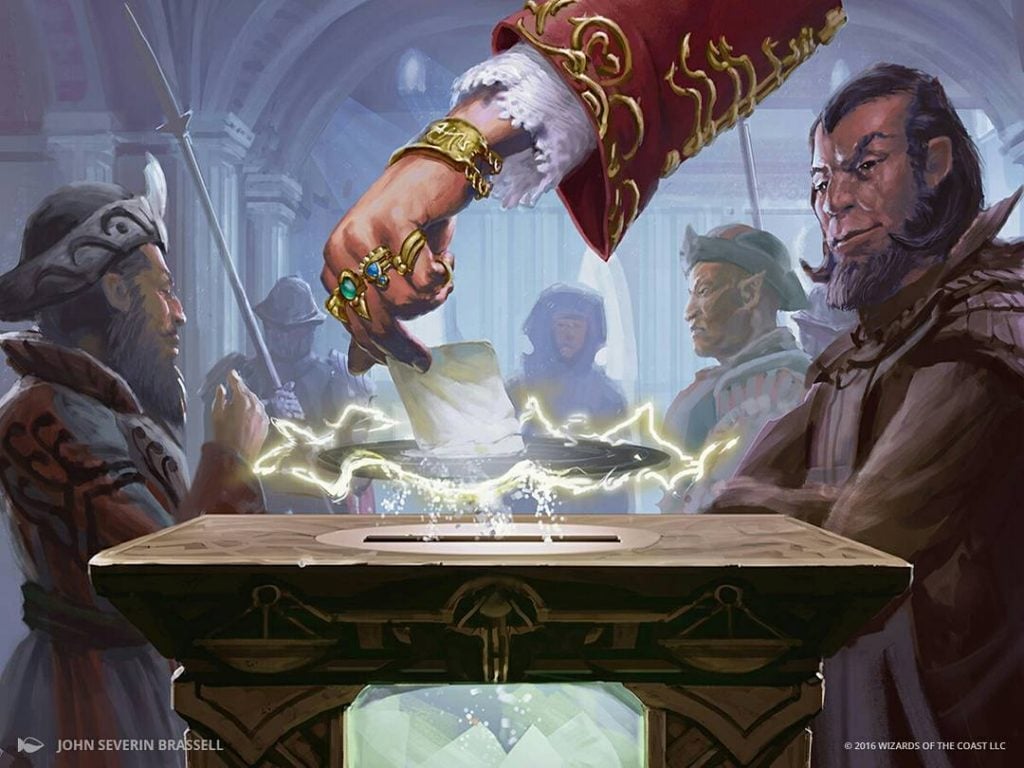
Illusion of Choice | Illustration by John Severin Brassel
There are a few questions I considered when ranking the MTG games:
- First, is it an accurate representation of paper Magic? Does it have multiplayer, and can you trade cards with others? Are you actually building decks and playing Magic digitally, or is it something else entirely?
- Second, how well is (or was) it supported? Was it updated regularly as more sets were released? Was there support for competitive play, officially sanctioned or otherwise?
- Finally, is it worth it? Is it fun? Does it look good? Is it challenging enough to sink time and money into? And how’s its replayability? If it’s not trying to replicate the paper Magic experience, is it executing another genre well?
#12. The Magic: the Gathering Interactive Encyclopedia (1999)
No products found.Okay, No products found. isn’t really a game, it’s just an early encyclopedia of cards that was released in 1999 and defunct in 2002. The Interactive Encyclopedia is outclassed by powerful online MTG card databases like ScryFall and Gatherer, and the simple fact that we all have a smartphone has removed the need for this antiquated program.
No products found.
#11. Magic: the Gathering (1997)
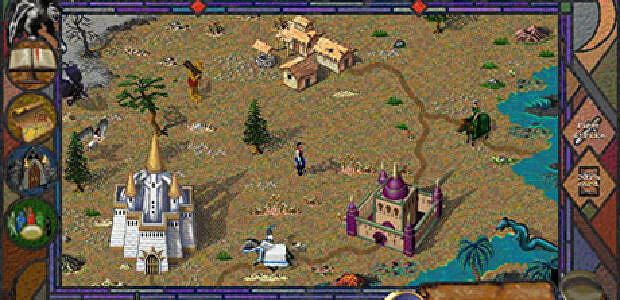
Commonly known as “Shandalar,” the first Magic: the Gathering video game was just titled “Magic: the Gathering.” The game is a simple simulation of paper Magic with RPG elements included, like a randomly generated world map and dungeons populated with real-time enemies to duel when encountered and towns and merchants to buy and trade cards with.
Besides the single player campaign, the game also supported tournament and free-play duel modes. The game was generally regarded as a success with an expansion released later that year and an upgraded rerelease the following year.
Magic was just entering its fifth year when Shandalar was released. With a comparatively small card pool to pull from, the game does create an accurate representation of Magic at the time. But without multiplayer support, building and playing decks against the same computer players over and over becomes monotonous. The random world map and dungeons sort of compensates for this, but the game quickly became outdated as developer MicroProse sunk in 2001.
#10. Magic the Gathering: Battlemage (1997)

WotC’s next venture into the digital medium came with the help of publisher Acclaim, famous for the Tourach and early Mortal Kombat series. Battlemage was released on PlayStation and PC and was developed to be inspired by the paper Magic experience rather than an exact simulation. It featured real-time battles where players summoned iconic creatures and micromanaged their movements on a battlefield. Players could engage in a single player campaign or duel each other in 2-player battles.
Battlemage was poorly received. Poor graphics, a steep learning curve, and a difficult interface make the game very unappealing to look at, let alone play. Other real-time strategy games had it beat by leaps and bounds. Age of Empires and Warcraft 2 had both just hit the scene and absorbed much of what would have been Battlemage’s audience.
- Real-time strategic warfare based on the Magic the Gathering trading card game
- Over 200 creatures and spells
- Varying levels of action and strategy difficulties
- All of the cards from the original game are represented
- For 1 or 2 player
#9. Magic the Gathering: Armageddon (1997)
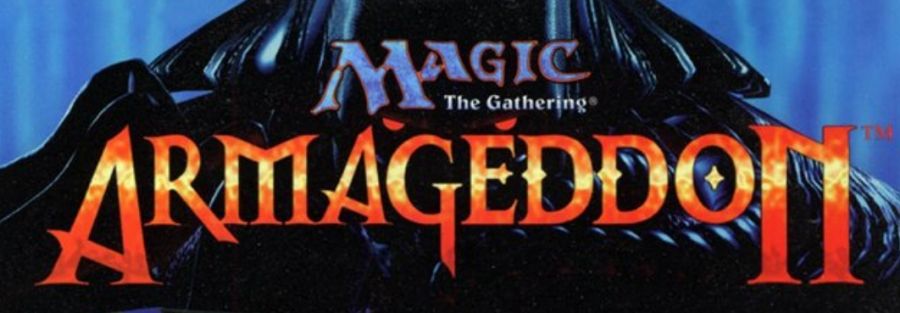
The handful of coin-operated arcade cabinets bearing the name “Magic: the Gathering: Armageddon” are a lonesome bunch, if any still exist. Effectively an upgraded port of BattleMage, Armageddon featured the same mechanics and real-time strategy combat but with simpler controls and more players. Allegedly only four were ever put into production, and their current whereabouts are unknown.
While Armageddon’s simpler overall presentation addresses the learning curve and awkward controls of BattleMage, it makes you pay for this in literal quarters. Definitely worth a couple plays if you see one still standing in an arcade, but I won’t be clamoring for a reissue anytime soon.
#8. Magic the Gathering: Tactics (2011)
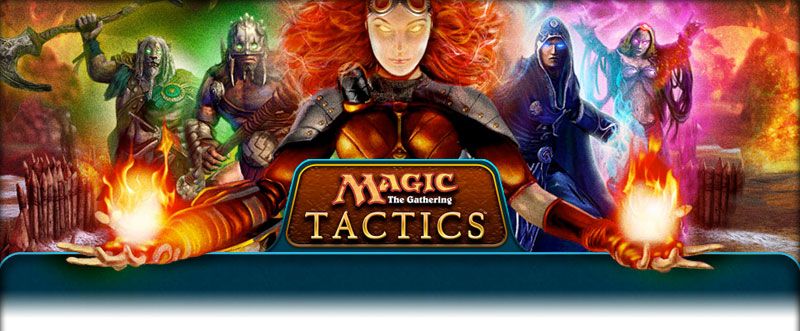
Magic Tactics was a turn-based strategy battle game that plays out sort of like chess with a Magic skin. You control a planeswalker, summon creatures, and cast spells on a grid-based battlefield in something akin to a digital version of the D&D Miniatures battle game.
While the game included “deckbuilding” and trading, the core mechanics of the game differ so much from the card game that it's nearly unrecognizable. It had a small devoted following and was supported for several years after its release.
#7. Magic the Gathering: Battlegrounds (2003)

Battlegrounds saw yet another attempt at a real-time strategy combat game for Xbox and PC in 2003. Each battle saw two wizards (or “duelists,” or whatever WotC landed on this time instead of “planeswalker”) dance around each other and send preselected creatures and spells across a battlefield. Mana is locked to a timer and “spellbooks” are 10 cards of no more than two colors.
What I’m sure started out as an interesting visualization of the actual battles planeswalkers partake in against one another resulted in a clunky fighting game populated by Soulcalibur rejects.
#6. Magic: the Gathering (Sega Dreamcast, 2001)

In 2001, an exclusive MTG video game was released in Japan for the Sega Dreamcast, imaginatively titled “Magic: the Gathering.” The Dreamcast game was one of the closest attempts yet at simulating a true paper Magic experience and would become the skeleton for the digital Magic products from here on out.
Interestingly, it featured the first instance of unique cards with mechanics that would be impossible to replicate in real life. Cards like Murgish Cemetery that randomly selects a number between two and six couldn’t be easily replicated with a simple dice roll (I guess they’ve never had to play Warhammer 40,000).
The biggest critique of the Dreamcast MTG game is its interface. Once again, allowing for the subtleties of priority and the multitudes of actions you can take in any given moment prove difficult to manifest in a digital space. This game is a good star though, and we’ll see this skeleton improved on in the years to come.
#5. MTG Puzzle Quest (2015)
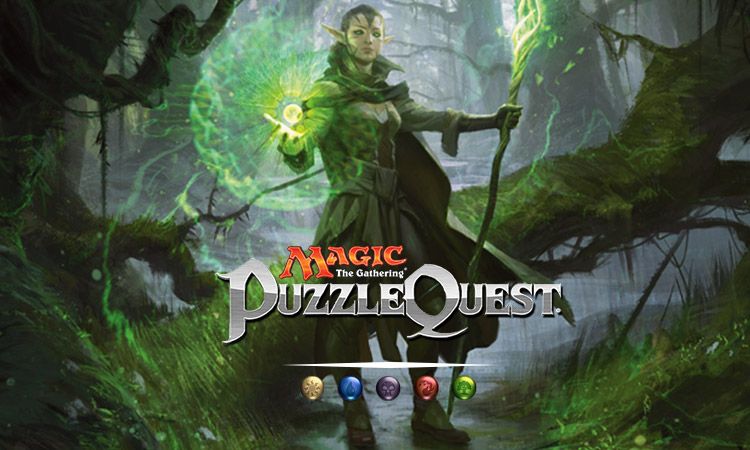
The mobile game MTG Puzzle Quest (Google Play | App Store) is a classic Candy Crush-esque gem-matching game with a little Magic spice thrown on top. The game takes a lot of mechanics from Magic and applies them in interesting ways to the simple app game. Instead of matching little candies, or plants and zombies, or angry birds or whatever, you match different combinations of mana to pay the cost for spells in your hand which you use to defeat the opposing planeswalker (also matching gems from the shared pool).
But the game suffers from the same monetization drawbacks that all mobile games do. That is to say, it exists solely to tempt you to spend a dollar here and there to unlock a new card or get another life or boost your cooldown time. I can’t recommend spending a lot of time playing this, but it serves its purpose as “something-that-isn’t-Twitter” to fiddle with while you wait in line at the next prerelease.
#4. Magic the Gathering: Duels of the Planeswalkers (2009, 2012, 2013, 2014, 2015)
The original Duels of the Planeswalkers, released on Xbox 360, Playstation3, and PC in 2009, was a true paper Magic experience. It auto-tapped lands to save time and fixed the priority problems of earlier games by adding a timer for players to pause when they wanted to respond, allowing for a smooth multiplayer experience.
Duels of the Planeswalkers was generally well received and was supported with DLC until 2011 when its follow-up was released. DotP 2012 added more cards and the Archenemy format. DotP 2013 added the Planechase format with Sealed formats added in 2014 and, finally, deck construction in DotP 2015. At last, players could build entirely new decks in an exciting digital world! Except the grindy gameplay and general cynicism for microtransactions would spell its downfall.
I have fond memories of playing through each of the single player campaigns in the Duels of the Planeswalkers titles. What the game lacked in diversity they made up for in cost. $10 is just about as much game as I can squeeze out of these titles.
By the end of the series these were close to being near analogs to paper Magic and were excellent introductions to the card game.
#3. Magic Duels (2015)
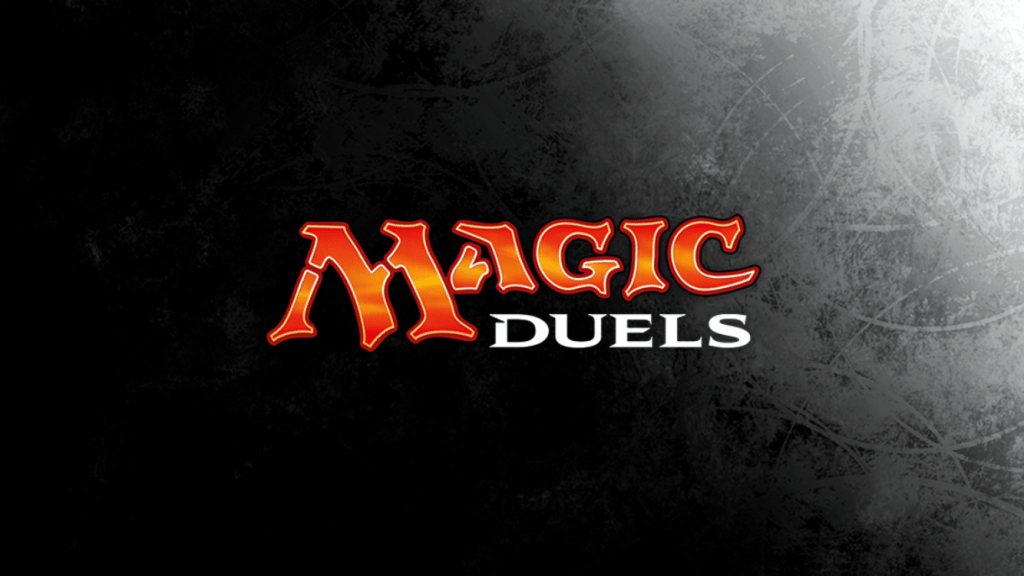
Possibly the most controversial Magic video game title, Magic Duels is the successor to the Duels of the Planeswalkers series. It was the first to allow players to track their card libraries and freely build their decks, albeit with the caveat that they were limited to one mythic, two rares, and three uncommons per deck.
Magic Duels was originally named “Magic Duels: Origins” to coincide with the release of the physical Magic Origins set. New Standard sets were added to the game with each release until November 2019 when Wizards announced it was ending support for the game and removing it from digital storefronts, abandoning it for MTG Arena. This understandably made some fans upset. A lot had spent hundreds of dollars on the microtransactions to buy booster packs and craft powerful decks in-game, and now that was all gone.
Magic Duels served its purpose as the predecessor to Arena. It was a necessary steppingstone between the console releases and Magic Online.
#2. Magic: the Gathering Online (2002+)
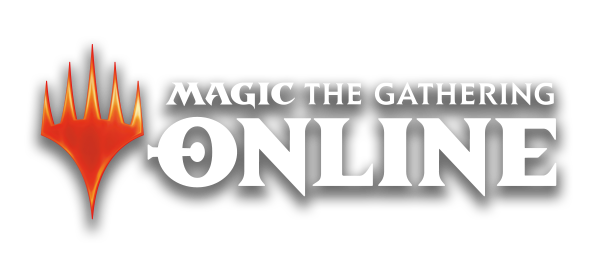
MTGO truly has grown into a beast of its own since its inception as a digital companion to paper Magic. Magic Online was developed to finally find a way to digitize the paper Magic experience, including the price! Digital cards are purchased in digital packs and can be traded between players, allowing a parallel economy to thrive alongside the real secondary market. Competitive formats were well-supported by WotC, with DCI-sanctioned events in the usual formats.
MTGO has been praised as a great introduction to new players since the game plays out the complexities of priority and resolves difficult board states for you. But Magic Online’s greatest strength is that every card from every set has been implemented into the platform, and cards will continue to be added for the foreseeable future. The immense card pool makes it ideal for a player looking to try out a lot of formats.
Its greatest weakness is its awful interface. I understand that implementing every Magic card into the game must take precedence, but come on. MTGO’s boring visuals and less-than-intuitive interface don’t make it great for new players, just better.
#1. Magic: the Gathering Arena (2018)
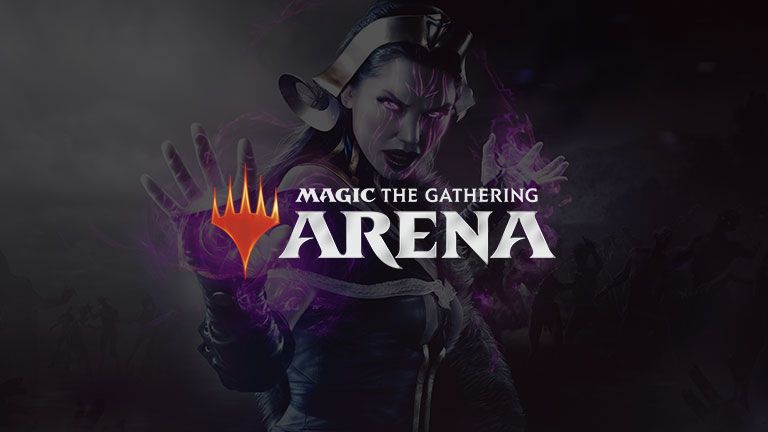
Wizards finally got it just right in 2018. MTG Arena promised to be the missing piece between the complexity of the Magic card game and the freedom of a digital space. The game sought to be the modern experience for digital Magic gameplay, easily shortcutting gameplay so it flows as naturally as the real thing. It also linked Magic to the Esports world and the 2020 Magic World Championship Standard matches were played on Arena.
Arena is free to play with the option to buy in-game currency to buy packs and participate in events. The microtransactions on Arena aren’t as poor as Duels’ were and you could play the game for years without ever spending a cent on it without missing out on much content. The biggest drawback is its lack of trading between players. Without ways to offload extra cards your collection becomes bloated with useless digital cards that you can’t help but wish you could exchange.
Arena has recently revisited the concept of cards that can only function in an online environment and has expanded this concept into an entirely new format, Alchemy. The reviews on Alchemy are mixed (I’m not personally a fan), but I like that these cards have been mostly cordoned off to their own format, leaving a classic Magic game still just a tap away.
And I have to say that the tutorial for Arena is just excellent. I’m ashamed to admit I use it to teach new players the basics of Magic instead of running an intro game myself. It’s a simple introduction to the game that covers all the major ways cards interact with each other and seems to have replaced the starter deck in WotC’s eye.
Is Magic: the Gathering on PS4 or PS5? Xbox? Nintendo?
There have been several console releases for Magic titles, though none have been released on Nintendo consoles. The first was Magic: Battlegrounds, released on Xbox in 2003. Each entry in the Duels of the Planeswalker series was released on PlayStation and Xbox, and Magic Duels was also released on both.
Are There Likely to be More MTG Video Games in the Future?
We may yet see more MTG video game titles. Wizards had plans for a new MTG game as recently as 2021 with Magic: Legends, a supposedly Diablo-like RPG set in the Magic universe. The open beta for the game launched on PlayStation 4, Xbox One, and PC in March 2021 but was shut down in October of that same year. The vision for the game, according to director Stephen Ricossa, “missed the mark.”
Wrap Up
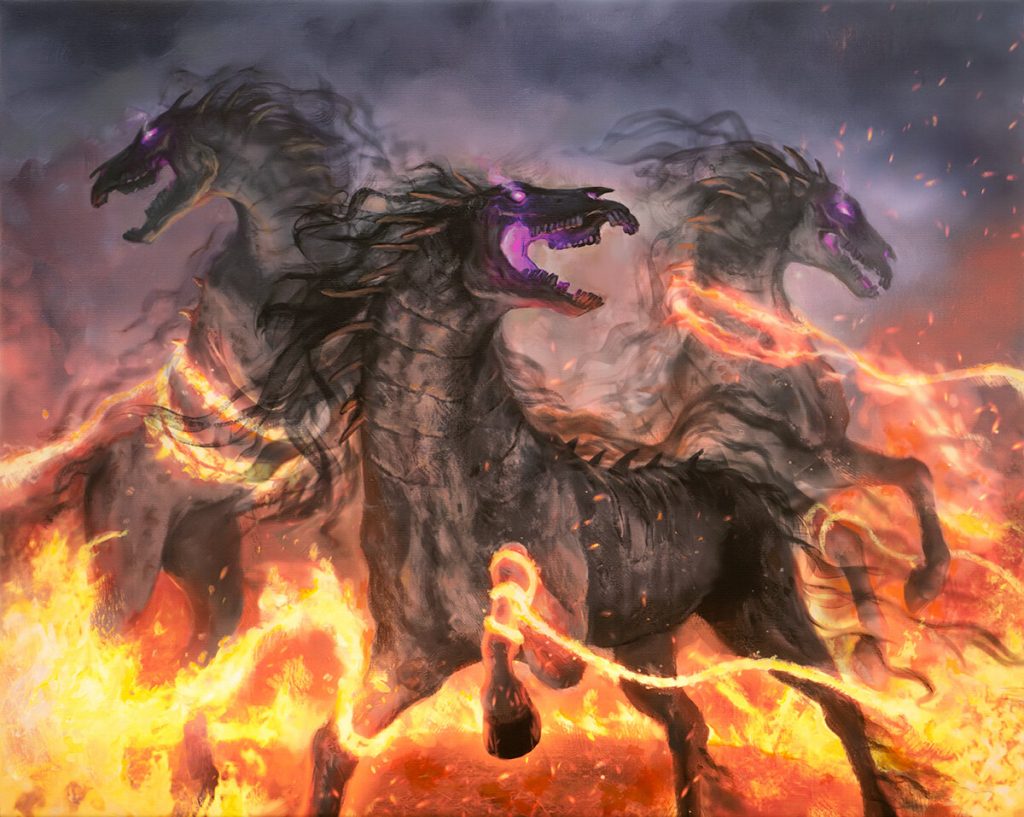
Wrap in Flames | Illustration by Käri Christensen
It might seem counterintuitive at first glance to expand a card game so reliant on the social aspect into a digital space. But Magic has potential to be as rewarding and fun experience in a video game as in real life, as we’ve seen after 30 years of trial and error. The video game space allows developers to push cards and rules in new directions we could never see in the physical card game, and I can’t wait to see what comes next for Arena and Magic Online.
Choosing between Arena and MTGO is difficult. They both seek to emulate paper Magic in different ways and are ultimately targeted towards different audiences. Whether you love one or the other, it’s clear those two are the top picks.
What do you think of my rating? Is Arena really the best Magic video game, or does MTGO hold that title? Will we ever hear from Magic: Legends again? And where on earth could those Armageddon arcade cabinets be? Would the MTG TV series breathe new life into a Magic video game? Let me know in the comments or over on Draftsim’s Twitter. And hey, if you’re Arena player, make sure to check out Draftsim’s Arena Tutor for personalized stats, deck tracking, and more.
Thanks for reading, and keep gaming!
Note: this post contains affiliate links. If you use these links to make a purchase, you’ll help Draftsim continue to provide awesome free articles and apps.
Follow Draftsim for awesome articles and set updates:

![Magic: The Gathering [Japan Import]](https://m.media-amazon.com/images/I/41wZ1lBcaeL._SL160_.jpg)
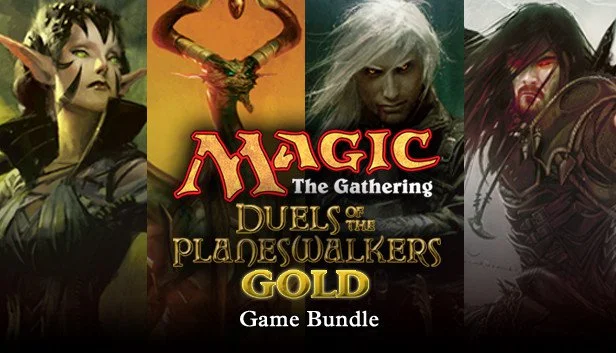
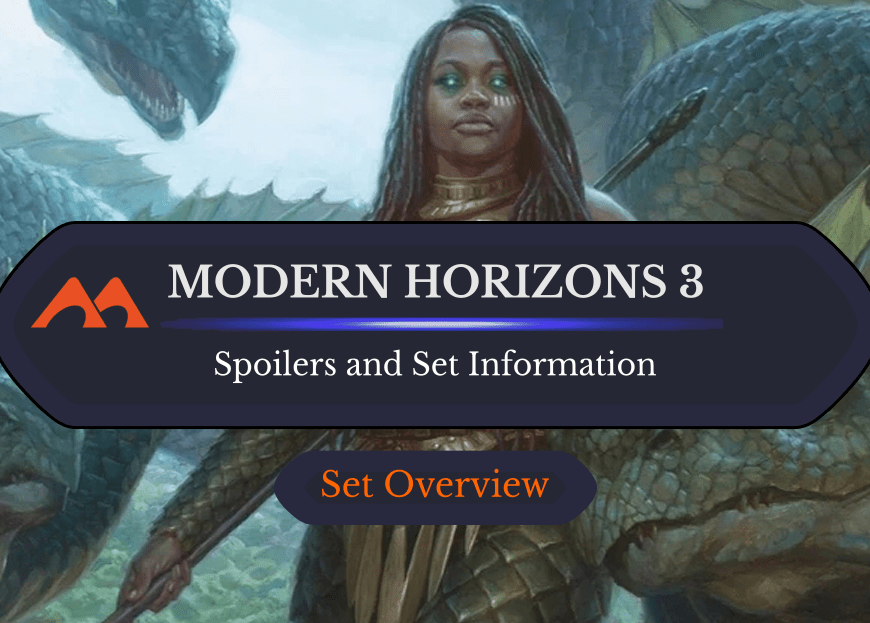
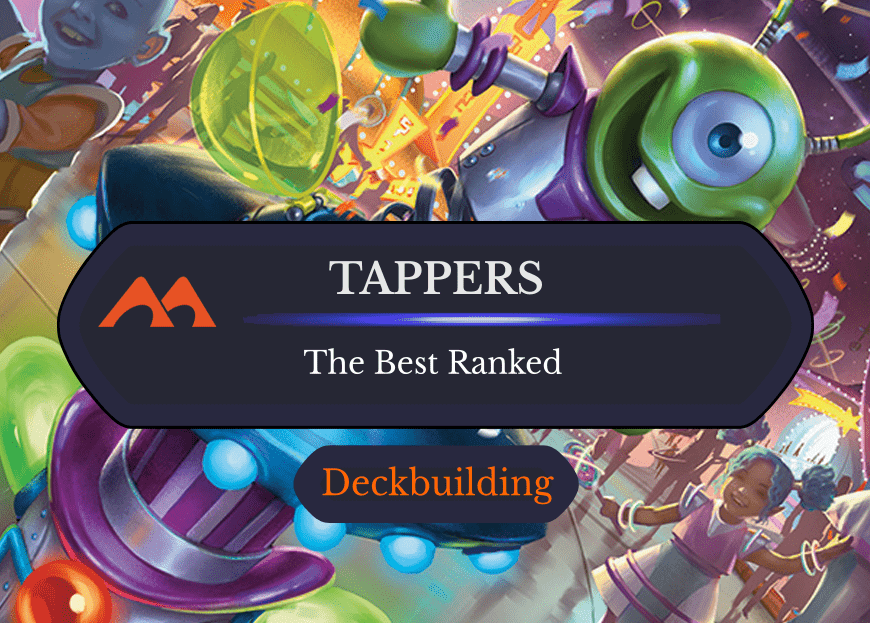
Add Comment